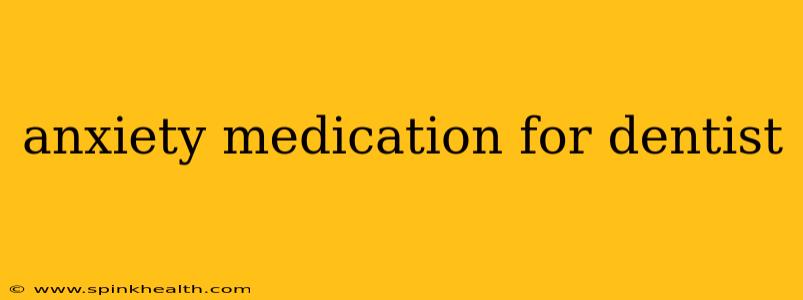Taming the Dental Drill: Exploring Anxiety Medication Options for Your Appointment
The whirring drill, the unfamiliar smells, the sheer anticipation – for many, a trip to the dentist can trigger a wave of anxiety. It's a common fear, and thankfully, there are ways to manage it. This article explores the options available for those who need a little help conquering their dental anxiety, focusing on medication specifically. We'll delve into the different types, discuss the pros and cons, and emphasize the importance of open communication with your dentist. Remember, your comfort and well-being are paramount.
This isn't a substitute for professional medical advice. Always consult your doctor or dentist before making any decisions regarding medication.
What are my options for anxiety medication before a dental appointment?
This is a crucial question, and the answer depends heavily on your individual needs and medical history. Your dentist and doctor will work together to determine the best course of action. They might suggest a range of approaches, including:
-
Short-term anxiety medications: These are often prescribed for single events like dental appointments. They can help alleviate anxiety and promote relaxation. Examples include benzodiazepines (like alprazolam or diazepam), but these are typically reserved for more severe cases due to potential side effects. Your doctor will carefully weigh the risks and benefits before prescribing them.
-
Alternative Medications: Your doctor might suggest other medications, such as beta-blockers, which primarily target physical symptoms of anxiety, like a racing heart. Again, this is a collaborative decision, tailored to your specific situation.
-
Non-Medication Options: Remember that medication isn't always necessary. Techniques like deep breathing exercises, mindfulness, or even listening to calming music can significantly reduce anxiety levels. Your dentist may also suggest strategies like discussing your concerns openly and scheduling shorter appointments to manage the experience more effectively.
What are the side effects of anxiety medication for dental procedures?
This is a vital concern. Side effects vary depending on the specific medication and your individual response. Some common side effects of anxiety medication include drowsiness, dizziness, and dry mouth. More severe side effects are rare but possible and should be discussed thoroughly with your prescribing physician. Always inform your dentist about any medication you are taking, even over-the-counter drugs, to avoid potential interactions.
Is there anything I can do to reduce my dental anxiety without medication?
Absolutely! Many people find that non-medication strategies are incredibly effective. Here are a few ideas:
-
Talk to your dentist: Open communication is key. Explain your anxieties; they are experienced professionals trained to manage patient anxieties. They can tailor the appointment to minimize triggers and create a comfortable environment.
-
Relaxation techniques: Deep breathing exercises, progressive muscle relaxation, and mindfulness meditation can be extremely helpful in calming your nerves. Practice these techniques in the days leading up to your appointment.
-
Distraction: Bring something to distract you during the procedure, such as headphones and calming music.
-
Cognitive Behavioral Therapy (CBT): For persistent and overwhelming dental anxiety, CBT can be highly effective in changing negative thought patterns and managing fear.
How long does anxiety medication take to work for a dental appointment?
The onset of action varies depending on the medication and your individual metabolism. Your doctor will advise you on when to take the medication to ensure it takes effect before your appointment. It is important to follow their instructions precisely.
Are there any long-term effects of taking anxiety medication for dental appointments?
Typically, the medications used for single dental appointments don’t have long-term effects when used as directed. However, it's always best to discuss potential risks and benefits with your doctor. If you experience ongoing or severe anxiety, they may recommend long-term treatment options.
Can I drive myself home after taking anxiety medication for a dental appointment?
This depends entirely on the medication prescribed and its potential side effects. Some medications can cause drowsiness or impair judgment, making driving unsafe. Your doctor will inform you whether driving is safe after taking the medication. It's crucial to follow their advice. Planning ahead for transportation is essential if driving isn't recommended.
Remember, conquering dental anxiety is possible. Open communication with your dentist and a collaborative approach with your doctor can help you find the best solution to ensure a comfortable and successful dental experience.

